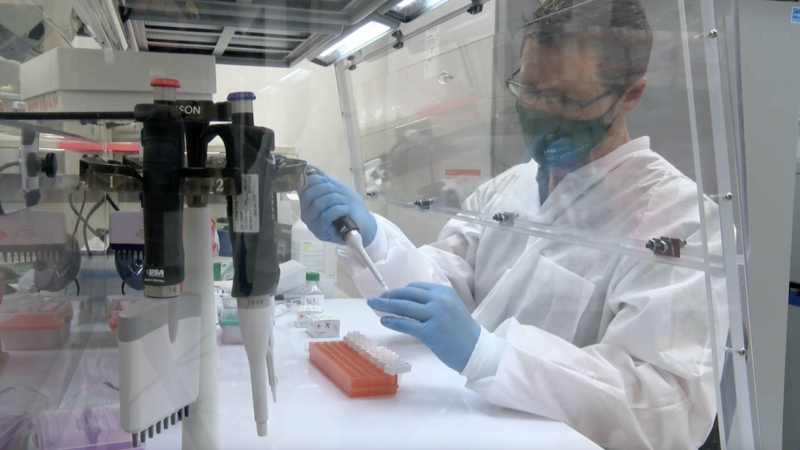Are UAB officials mum about grant cuts because they fear a spiteful president?
UAB stands to lose an estimated $70 million a year, if the Trump administration makes threatened cuts to federal research funding.
The threat of cuts to federal research grants still hangs over UAB, not to mention Birmingham and the state. The sudden reductions – applying to research institutions nationwide – have been put on hold by a federal judge, but the Trump administration says it remains committed to the belt-tightening.
Even though the cuts – which UAB estimates would cost the institution $70 million per year – have yet to officially take effect, reports from university personnel say they’re already having an impact. UAB administration officials have declined to answer questions about what, if any, effect the potential reductions are having on the institution. They’ve also declined to answer questions about what actions they’re taking to lobby against the cuts.
Instead, a spokesperson for the university sent a statement that they “continue to monitor, assess and address the developments regarding recent federal activity, and our government affairs professionals are actively engaged on the matter. We do not have additional information to share at this time.”
Details of the cuts
On February 7, the Trump-run National Institutes of Health issued a notice that would immediately cap indirect cost rates for all grants – new and existing – at 15%. About a month later, a federal judge issued a nationwide injunction on the cuts, saying the NIH ruling is unlawful.
But the judge gave the Trump administration 60 days to appeal the decision. So, the litigation continues, pending a future full hearing on the merits, leaving research institutions wondering if they’ll need to slash their budgets.
Nationwide impact
Dr. Elena Fuentes-Affleck is the chief scientific officer at the Association of American Medical Colleges, a lobbying group. She said the cuts will cause sweeping changes to research programs, nationwide.
“The impact is hard to underestimate, but it is huge,” she said. “The sudden nature of the announcements, along with the threats that they represent to financial stability, are very disruptive all across the country.”
She says the timing of the announcement about the cuts is also a big issue and is causing universities and other research institutions to delay making critical decisions.
“Every month is important, but this time in the spring is disproportionately recruitment and hiring time,” she said.
Faculty members concerned
Multiple UAB faculty members spoke with WBHM on the topic, but they asked not to be named, because they said the administration discouraged them from speaking with WBHM about this story.
“To a certain extent, I understand that,” said one faculty member, who asked to remain anonymous. “The stakes are so big.”
Then again, said that faculty member, “The stakes are so big, we need to plead our case.”
UAB’s Dr. Peter Pappas did speak with WBHM. He’s partially retired, but still works as an emeritus professor of medicine at the university. He wanted to make clear he was not speaking on behalf of UAB and did not want to get into the discussion of why university officials were not being more assertive on the topic.
He wanted to be clear that he believes federal spending needs to be reigned in.
“Everybody understands that our budget is out of control,” he said. “And so I think everybody understands the need to tighten belts.”
National debt concerns, notwithstanding, Pappas wanted to make the point he believes strongly that NIH grants are worth the money.
“I think you could say pretty accurately that, as far as return on investment, you would really be hard pressed to find something that has a better ROI than money spent on medical research, especially from the NIH,” Pappas said.
He said there is little, if any, waste in these grants, even as they apply to indirect costs. Oftentimes called facilities and administrative costs, he noted they cover things like labs, air-conditioning, IT and data security, even hazardous waste management.
Impacts beyond the campus
Pappas also said the loss of this grant money would not only negatively affect the university but the city, as well.
“We all know that UAB is the biggest employer [in Birmingham]; and therefore, has a huge impact economically, statewide,” he said. “There are downstream effects that go well beyond the university.”
Cornell Wesley agreed. He’s the city of Birmingham’s economic opportunity director.
“The ripple effect will be huge,” he said. “NIH funding supports over 4,000 plus jobs directly with another 13,000 indirect.”
He also said research at the university helps save lives and has an economic impact on the state of just under $1 billion. He cited reporting from AL.com that the NIH cuts could cost UAB $70 million a year.
“It is a seismic sort of economic condition that we are self-inflicting upon ourselves unnecessarily,” he said. “It seems as though the government’s efforts to enhance efficiency and reduce costs may come at the expense of those whose revenues are vital for economic stability.”
“Fight for your worth”
Wesley said it’s critical that these points be made to the public to explain the consequences of the cuts.
“This right here affects your day-to-day life,” he said. “And it needs to be presented in such a way, because I think people will understand and will care about it and embrace the fact that this is something worth fighting for and worth preserving.”
That’s a point AL.com’s Pulitzer Prize-winning reporter John Archibald has also been trying to make. He understands the reasons why UAB officials might be reticent to push their case too hard.
“The only explanations I have is they are deathly afraid to say anything that would be perceived as anti-Donald Trump, that they will suffer the wrath of what happens when people don’t go along with the administration,” he said.
But Archibald said, as have others we spoke with about this story, UAB needs to speak now or deal with the consequences.
“I think that it’s really important to understand that you have to fight for your worth in this environment,” he said. “And you may be big … and you may wield a lot of power. But that can go away fast in this environment, and you need to tell people why you are important.”
The Trump administration has about 30 more days to file an appeal of the injunction that blocks the NIH cuts. NIH officials declined to say whether they plan on filing that appeal.
Meanwhile, the clock is ticking on what could be major changes at UAB, Birmingham, and the state as a whole.
UAB holds WBHM’s broadcast license, but our news and business departments operate independently.
“Editor’s note: This story has been updated to include the full text of a quote attributed to UAB.”
Kate Hudson on regret, rom-coms and finding a role that hits all the notes
Hudson always wanted to sing, but feared it would derail her acting career. Now she's up for an Oscar for her portrayal of a hairdresser who performs in a Neil Diamond tribute band in Song Sung Blue.
A powerful winter storm is roiling travel across the northeastern U.S.
Forecasters called travel conditions "extremely treacherous" and "nearly impossible" in areas hit hardest by the storm, and air and train traffic is at a standstill in many parts of the region.
U.K. arrests ex-ambassador to the U.S. on suspicion of misconduct over Epstein ties
Police have arrested Peter Mandelson, a veteran Labour Party politician who served as British ambassador to the U.S., as part of an investigation into his ties with Jeffrey Epstein.
What NPR reporters will remember most about these Winter Olympics
NPR's reporters on the ground in Italy reflect on a far-flung, jam-packed Winter Olympics.
In the shadow of the Olympics, migrants search for a welcome in Milan
As Italy cracks down on migration, Milan takes a different path — offering shelter and integration to asylum seekers even as the central government tightens borders and funds deterrence abroad.
Trump to raise global tariffs. And, most say the state of the union is weak, poll says
President Trump says he is raising global tariffs to 15%. And ahead of the president's address tomorrow, most Americans say the state of the union is not strong, according to an NPR poll.







